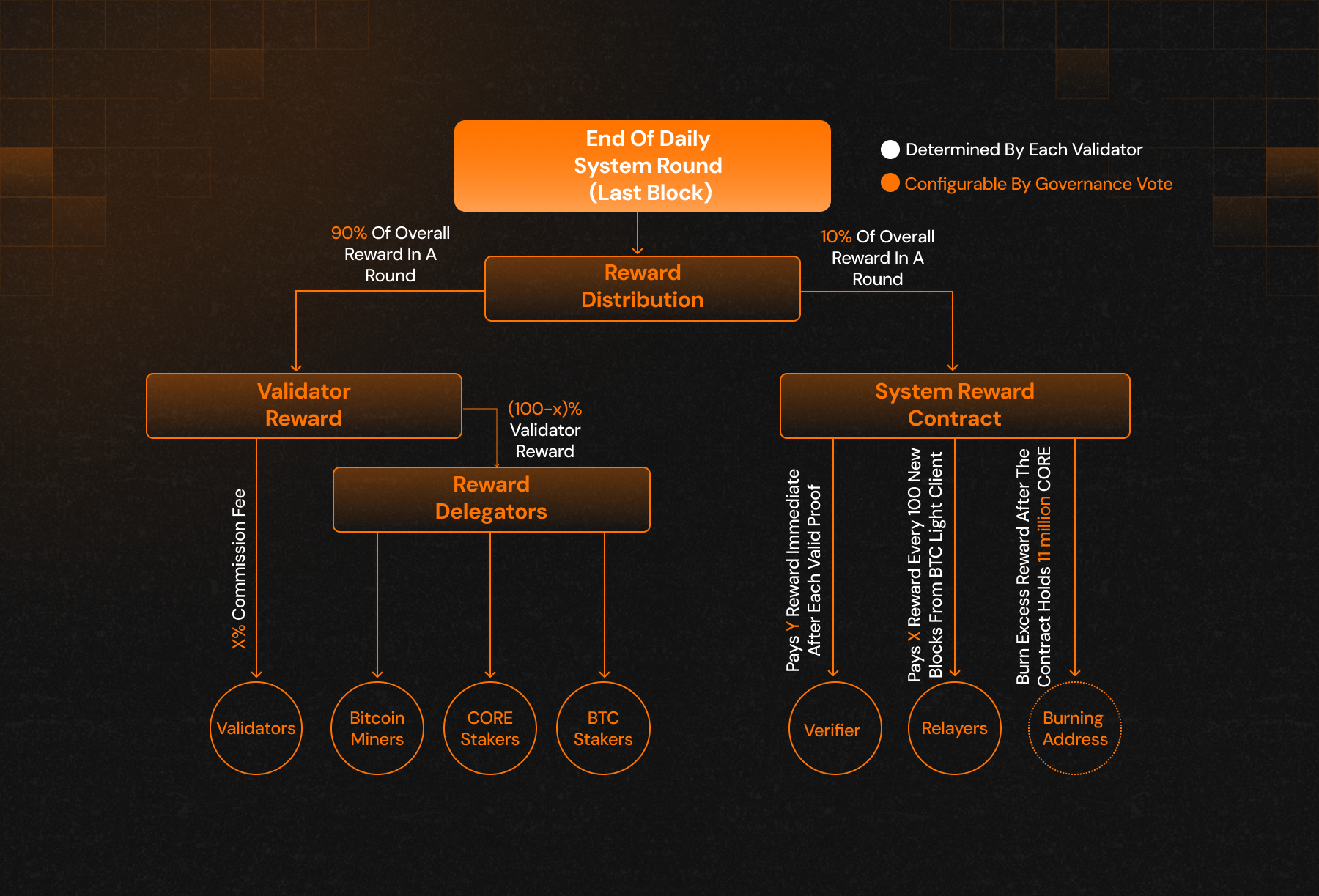Consensus Rewards
Overview
The Core network's reward system is a foundational component of the Satoshi Plus consensus, aligning incentives across miners, stakers, validators, relayers, and verifiers. Through this system, participants are compensated for contributing to network security, decentralization, and governance.
Rewards are distributed across four main categories:
- Mining (DPoW)
- Staking (CORE and Bitcoin)
- Validator Operations
- System-Level Roles (Relayers and Verifiers)
1. Mining Rewards (Delegated Proof of Work)
Who earns: Bitcoin miners and mining pools
Mechanism:
- Miners include validator delegation metadata in the Bitcoin blocks they mine.
- This enables them to extend support to Core without diverting resources from Bitcoin mining.
- In return, miners earn CORE tokens as supplemental rewards, in addition to regular Bitcoin block rewards.
2. Staking Rewards (CORE & Bitcoin)
Who earns: Holders of CORE or Bitcoin
Mechanism:
- Participants delegate CORE or timelocked Bitcoin to validators.
- Voting power is proportional to the amount delegated.
- Rewards are distributed based on a validator's performance and the participant's share of total delegation.
Rewards from staking encourage long-term participation and give delegators influence over validator selection.
3. Validator Rewards
Who earns: Validators, and their delegators (miners, CORE stakers, Bitcoin stakers)
Mechanism:
- Validators earn from two sources:
- Block Rewards: Newly minted CORE tokens
- Transaction Fees: Collected from each processed block
- Rewards are calculated and distributed at the end of each round (200 blocks / ~1 day)
Reward Split:
- 90% goes to validators (and their delegators/voters)
- 10% is allocated to the System Reward Contract
- Validators take a commission before distributing remaining rewards to their delegators
Validators are incentivized to offer competitive reward shares to attract delegators.
4. Reward Distribution Formula
After validator commission, the protocol calculates delegator rewards based on contribution type:
Hash Power Delegators (Miners & Mining Pools)
CORE Stakers
Bitcoin Stakers
Where:
- : Rewards attributed to delegated hash power (DPoW).
- : Rewards attributed to CORE staking (DPoS).
- : Rewards attributed to BTC staking.
- : Total rewards allocated to all delegators.
- : Proportion of rewards allocated to hash power.
- : Proportion of rewards allocated to CORE staking.
- : Proportion of rewards allocated to BTC staking.
- : Hybrid score of the validator.
5. Per-Unit Reward Calculations
Per unit reward calculations determine the rewards distributed for each staked unit of hash power, CORE, or BTC:
- Per unit hash power reward: =
- Per unit CORE reward: =
- Per unit BTC reward: of Pn = x Yield Multiplier for Leveln
Where:
- is the validator hash power rewards per unit;
- is the CORE token staking rewards per unit;
- of Pn is the BTC staking rewards per unit for delegator with PN BTC yield level
- Yield Multipliers: Each boosted yield level has a specific multiplier (e, f, g, h,..., etc) that is determined by a user's staking data as well as system Dual Staking settings. The settings are dynamically set through governance and reward users for pairing CORE and Bitcoin staking.
6. Dual Staking Impact on Bitcoin Rewards
Bitcoin staking rewards are tiered based on how much CORE a delegator has staked relative to their Bitcoin delegation.
- Higher tiers (e.g., Satoshi Tier) receive larger reward multipliers
- This creates a market-driven incentive for pairing CORE with Bitcoin to boost returns
Learn more about Dual Staking.
7. Reward Optimization Strategies
Delegators are incentivized to:
- Choose validators with smaller delegation pools, where their stake makes up a larger percentage
- Seek out validators with lower commission fees
- Balance staking across under-subscribed validators to maximize marginal yield
This dynamic fosters active delegation decisions and validator competition.
8. Relayer & Verifier Rewards
Relayers
- Relay Bitcoin block and transaction data to Core
- Paid from the System Reward Contract
- Rewards are batched every 100 Bitcoin blocks
- Claimed periodically by relayers
Verifiers
- Monitor validators for malicious behavior (e.g. double signing)
- When they submit valid reports, rewards are issued immediately from the System Reward Contract
Note: The System Reward Contract is capped at 10 million CORE tokens. Any overflow is burned, making excess participation deflationary.
Conclusion

Core's reward system properly incentivizes and aligns miners, stakers, validators, and infrastructure roles. Through a transparent and configurable system, rewards drive security, decentralization, and sustained community participation across Satoshi Plus consensus.